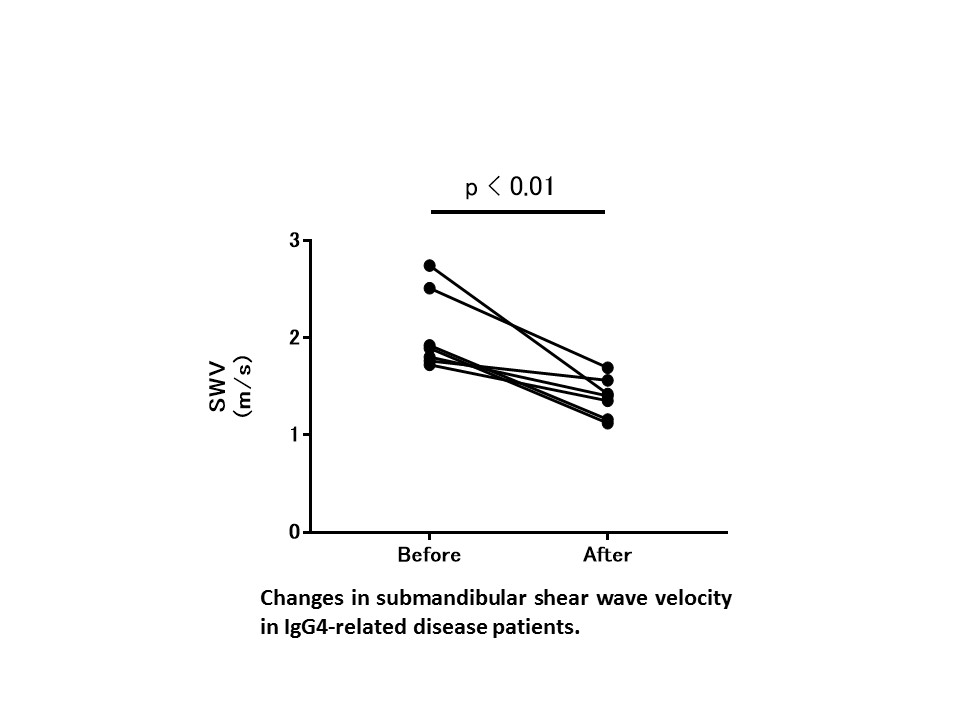Session Information
Date: Monday, October 22, 2018
Title: Vasculitis Poster II: Behҫet’s Disease and IgG4-Related Disease
Session Type: ACR Poster Session B
Session Time: 9:00AM-11:00AM
Background/Purpose: IgG4-related disease (IgG4RD) is a chronic and systemic disease that can involve multiple organs. One of the most commonly involved organs are the salivary glands. Shear wave elastography is an ultrasonography technique that provides an estimate of tissue elasticity. We present the salivary gland sonographic findings in IgG4RD patients.
Methods: We retrospectively investigated the salivary gland sonographic features of IgG4RD patients who fulfilled the diagnostic criteria for IgG4RD. Salivary gland ultrasonography was performed in our hospital from April 2016 to April 2018. We assessed sex, age, symptoms, and ultrasonographic findings. Shear wave elastography was performed in 9 patients with IgG4RD, 33 patients with Sjogren syndrome and 13 healthy controls. Mean shear wave velocity (SWV) in m/s was compared between IgG4RD patients, Sjogren syndrome patients and healthy controls.
Results: The mean age of IgG4RD patients was 69.7 ± 8.58 years old. From 11 IgG4RD patients (7 males and 4 females), 7 patients had multiple hypoechoic lesions in the submandibular glands. Only one IgG4RD patient had multiple hypoechoic lesions in the parotid glands. For the submandibular glands, mean SWV was significantly higher in the active IgG4-related sialadenitis group than in the stable IgG4RD group (2.54 ± 0.92 vs 1.58 ± 0.29, p < 0.001). A significant decrease in both SWV and the volume of the glands was also observed in active IgG4-related sialadenitis patients who achieved remission (p < 0.01, p < 0.05, respectively). For the submandibular glands, mean SWV values were significantly higher in the active IgG4-related sialadenitis group than in the Sjogren syndrome group (2.54 ± 0.92 vs 1.54 ± 0.24, p < 0.001), and in the active IgG4-related sialadenitis group than in the healthy controls (2.54 ± 0.92 vs 1.66 ± 0.27, p < 0.001), respectively.
Conclusion: Changes in the submandibular glands affected by IgG4-RD could be easily detected using ultrasonography. Shear wave elastography of submandibular gland may contribute to the evaluation of disease activity in IgG4-related sialadenitis.

To cite this abstract in AMA style:
Nishimura K, Kadoba K, Mukoyama H, Saito R, Waki D, Yokota T. Shear Wave Elastography in the Evaluation of Submandibular Gland Characteristics in IgG4-Related Disease [abstract]. Arthritis Rheumatol. 2018; 70 (suppl 9). https://acrabstracts.org/abstract/shear-wave-elastography-in-the-evaluation-of-submandibular-gland-characteristics-in-igg4-related-disease/. Accessed .« Back to 2018 ACR/ARHP Annual Meeting
ACR Meeting Abstracts - https://acrabstracts.org/abstract/shear-wave-elastography-in-the-evaluation-of-submandibular-gland-characteristics-in-igg4-related-disease/
